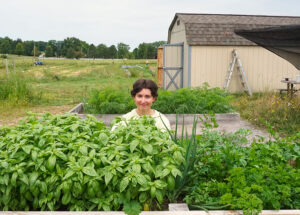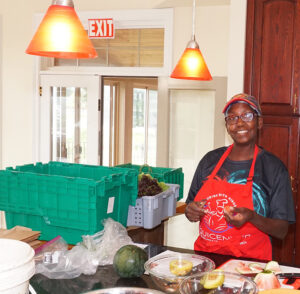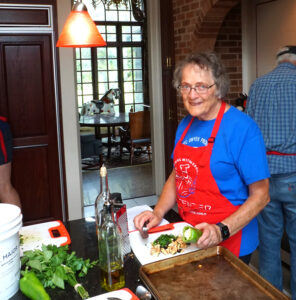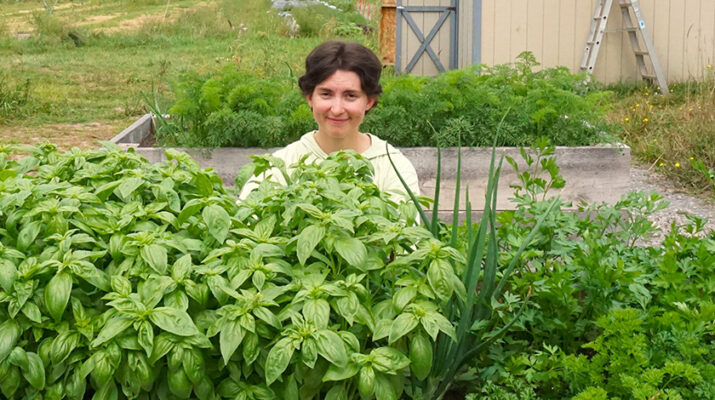EquiCenter’s adaptive cooking and riding programs in Honeoye Falls was specially created for children and adult with disabilities, especially veterans
By Mike Costanza

Each week, Jaime Cox heads to EquiCenter to develop a better relationship with a horse.
“I love working with the horses,” the 57-year-old ex-Marine said. “For me, it’s just incredible.”
Cox is just one of the many adults and children who head to EquiCenter each year to grow as individuals, learn new skills or study horticulture.
The nonprofit, which is located on the 200-acre William & Mildred Levine Ranch in Honeoye Falls, offers a wealth of programs and classes to help them do so.
Though many of its programs involve horses, EquiCenter’s clients can also learn how to cook healthy meals, attend workshops on the importance of bees to horticulture, work with the crops on the facility’s three-acre organic farm or engage in many other beneficial activities.
EquiCenter’s adaptive riding program was specially created for adults and children who might not ordinarily be able to experience the pleasure of working with horses. Those who suffer from cerebral palsy, Down syndrome, spinal cord injuries, intellectual challenges and other conditions and syndromes have all been able to learn how to work with the animals and even ride them.
“We have programs that we can offer to anybody of any age, of any ability,” said Lindsay Alberts, EquiCenter’s director of equine operations. “We strive to tailor every single one of our lessons to the individual’s goals.”

Depending on their ability, some students might only be able to learn how to groom and lead horses. Those who are more capable of riding, but still have difficulty staying upright in the saddle, could be trained to ride with the assistance of the nonprofit’s staff.
“We can have up to one leader and two sidewalkers per student for the safety of that student while on horseback,” Alberts said.
The leader leads the horse and the sidewalkers steady the rider. All work together to help the person in the saddle gain both physically and emotionally from the experience of being atop a 1,000-pound animal.
“They are very large animals, so just working around them on the ground or on their back builds self-confidence in people,” Alberts said. “It’s something they can gain strength in emotionally and physically.”
EquiCenter is an accredited member of the Professional Association of Therapeutic Horsemanship International (PATH). All of its instructors are PATH-certified, and must abide by that organization’s stringent safety rules and regulations.
A number of EquiCenter’s programs are designed specifically for those who once served their country.
Mission Mustang brings veterans and wild horses together, benefiting both. The program’s mustangs, which EquiCenter buys from the US Bureau of Land Management, were born free on the plains of Wyoming and Montana. When they arrive at EquiCenter, they are so frightened of humans as to be unapproachable.
The veterans who enroll in Mission Mustang work individually with its horses, training them until they are ready to accept human contact. The process, called “gentling,” requires soothing, effective communications between the veteran and the horse.
“They’re constantly communicating to each other, but it’s through body language,” said Emma Minteer, Mission Mustang’s head trainer. “As a participant in the program, you have to change the way you’re communicating in a way that they understand.”
The veteran has to show leadership, but not through direct coercion.
“You’re not forcing the horse to do anything, but that horse is [eventually] willing to say ‘I trust you,’” Minteer explained.
The process benefits both horse and handler.
“You’re taking these wild horses and you’re gentling them, and in the process the individual who is working with the horse is learning a lot about themselves,” Minteer said.
During nearly 21 years with the Marine Corps, Cox saw combat in Somalia and Haiti, in Operation Desert Storm and during two tours in Iraq.
“I was an attack helicopter pilot, which is a very close-up and personal skill,” the 57-year-old Pittsford resident said.
Cox was a ground-based forward air controller in Fallujah, Iraq, when he got involved in a firefight.
“A mortar hit about five feet behind me, and the back of both legs had a significant amount of shrapnel in them,” he said. “Luckily my flak jacket and helmet protected me from the waist up!”
Cox received a Purple Heart for his wounds and left the Marines in 2008 with the rank of lieutenant colonel. He went on to become the CEO of two nonprofit organizations, the last of them the United Way of Northern New York and is currently between jobs. He took time off from his regular weekly session with a 7-year-old mustang to speak to In Good Health.
The beautiful animal didn’t have a name when Cox stepped into the paddock — EquiCenter’s wild horses aren’t named until they’ve progressed in the gentling process. That didn’t stop him from engaging with the mare in ways that benefited them both.
“When it’s just you and the horse standing in the ring, the horse is going to pick up on everything that you do, whether it be your motions, your emotions, your anxiety,” Cox said. “The more you want the horse to be trained, the more you actually have to relax.”
Cox approached her slowly and carefully, ready to respond to her reactions.
“You have to fight everything that you have to not just reach out [with a hand], because it will spook the horse,” he said.
If she tensed or backed away, Cox stood still or backed up, giving the mare room. Minteer was on hand to guide him, though she left most of the decisions up to him.
“I’ll step in and help and show, but at the end of the day it’s the participant’s job to get that horse to reach those goals that they’re striving for,” she said.
Eventually, the horse grew comfortable with being very lightly stroked with a whip.
“I’ll use the tail end of a whip to just rub her flanks, so she can get used to touches,” Cox said.
The mare eventually came to trust Cox well enough to allow him to lightly touch her muzzle.
Minteer said each mustang is different, and there’s no way to tell how long it will take to train a wild mustang to become comfortable with human contact. Once they have been gentled, they’re sold to new homes.
Cooking classes
 Veterans who are seeking a tastier experience can sign up for Cooking for Heroes, a class that teaches how to prepare nutritious meals. Chef Ellen Adams, who teaches the class, said military life leaves some who have served their country unable to function in the kitchen.
Veterans who are seeking a tastier experience can sign up for Cooking for Heroes, a class that teaches how to prepare nutritious meals. Chef Ellen Adams, who teaches the class, said military life leaves some who have served their country unable to function in the kitchen.
“I’ve worked with veterans who didn’t really know how to cook an egg or how to cook a carrot or a piece of chicken, because the military does that for you,” she said. “Our goal here is to teach veterans how to cook healthy food.”
Adams seems well-prepared to help veterans reach that goal. After 20 years in the US Air Force, including the time she spent in Iraq, she went on to study culinary arts — her training included an internship in Italy. Since graduating, she has taught cooking to private individuals, families and veterans. She also founded and runs her own business, Red Hot Dish…and Great Food Too, through which she offers her services as personal chef.
In 2015, Adams decided to test her skills in a Military Vets episode of “Chopped,” the Food Network show in which contestants turn baskets of mystery ingredients into three-course meals. She didn’t win, but local veterans gained from her appearance.
“A viewer saw the show, liked my story and donated $10,000 to the EquiCenter to start the Cooking with Heroes kitchen,” she said.
One sunny afternoon, Adams helped other vets learn how to prepare a tasty lunch in EquiCenter’s kitchen that included stuffed zucchini and grilled kale with apples, almonds, ricotta cheese and homemade dressing.
“Ninety percent of everything we’re cooking today is from the farm,” Adams said. “The only thing I bought today was some sausage and ground beef.”

Over at one counter, Stacy Lundy was cutting up what she called “mini-melons.”
“Like a miniature cantaloupe family and another from the watermelon family,” the 54-year-old ex-Marine said.
Gathering with other vets to cook helps Lundy deal with the post-traumatic stress disorder she suffers as a result of her three years in the service.
“I really like to cook and it’s, like, a happy place for me,” she said.

Donna Korf enlisted in the US Army back in 1964, expecting to see the world.
“We had the Cold War going on,” the 81-year-old retired nurse said. “[I] never expected to go to war.”
Four months later, Korf was ordered to board a boat for Vietnam. When she disembarked, she found the hospital in which she’d expected to work hadn’t been built and the area was not completely secure.
“That first night, we were told not to have any flashlights, any lights, because there were Viet Cong about six blocks from us,” she said.
After two years in Vietnam, Korf headed back to the US.
“I couldn’t take another year there,” she said.
Korf became a civilian and went on to spend 25 years with the Veterans Administration before retiring. When asked what she likes about her Cooking with Heroes class, she was succinct.
“The support and the understanding from other veterans,” Korf explained. “Can’t get that elsewhere.”
In addition to preparing nutritious meals, veterans also help grow their ingredients on EquiCenter Farm, the nonprofit’s organic farm. The hands-on experience can be very valuable to them.
“Primarily, this…is a teaching-and-learning farm,” said Sarah Lichtman, who manages EquiCenter Farm. “Veterans can come, have meaningful outdoor experiences, can learn about growing things, can learn about themselves through learning about growing things.”
Even kids can stick their hands into the soil as part of EquiCenter’s Horticulture & Equine Active Learning (HEAL) program. The program regularly offers groups of students from local schools the opportunity to get hands-on experiences with horses and horticulture during field trips.
“We rotate them through stations to give them a more holistic experience, engaging both with plants and animals and other aspects of nature,” said Kevin Stewart, EquiCenter’s horticulture community outreach administrator.
Depending upon a student’s capabilities, he or she might learn how to groom or walk a horse, or just learn about the animal’s anatomy. They can also dig their hands into the soil, learning first-hand about how food is grown and the importance of horticulture.
“We make sure people know that every seed-based plant isn’t just an activity for that day, but that it’s feeding somebody in the community,” Stewart said.
In addition to the physical experiences that HEAL offers, students have opportunities to develop personally.
“We also work in team-building exercises and social-emotional learning,” Stewart said. “As students get to know horses and their natural environment, they’re also getting to know their peers and themselves to a deeper level.”
Field trips can take as little as half a day or involve multiple visits to the center. Students who participate in HEAL get to take home some of the food they’ve helped grow, but most of EquiCenter’s produce is given to food pantries and other facilities that aid the needy.

